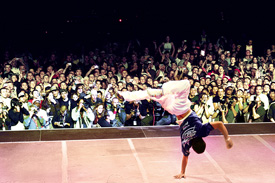
Every summer, the world’s best breakdancers, also known as b-boys, converge for the “Battle of the Year,” a competition for the title of world’s best dance crew.
Planet B-Boy is director Benson Lee’s documentary chronicling the two months leading up to the “Battle of the Year.” The film follows several crews in different corners of the world as they prepare for the competition.
Yes, it’s sort of like America’s Best Dance Crew but without Randy Jackson or Mario Lopez.
Planet B-Boy, which is playing at Landmark E Street Cinema tonight through Sunday, also shines light on the globalization of hip-hop, its influences and growth.
“B-boying is very deep,” Lee said. “It unites communities. It’s like a subculture in the culture of hip-hop.”
Lee emphasized that it’s the least racist of the subgroups of the hip-hop culture, which also includes emceeing (rapping), DJ-ing and graffiti.
“It doesn’t matter if you’re black or white or Asian,” Lee said. “You get respect by how you can dance.”
A scene in the trailer for the film discusses the commercialization of hip-hop and its exploitation in the ’80s. In another, someone says, “This dance never died. It just died in business.”
Recent movies, such as How She Move, and shows, such as America’s Best Dance Crew, have proven how street and hip-hop dancing can be marketed in the mainstream, but Lee said he believes b-boying “deserves to have its own platform” because “the commercial scene … shows no awareness of b-boying.”
“The b-boy culture is probably still not as widely known or recognized by some people because they still see it as some awkward form of dance or random movements,” sophomore physiology and neurobiology major David Cheng said. Cheng is also a member of the B-Terps, an on-campus b-boy club.
“[Americas’s Best Dance Crew’s JabbaWockeeZ] consistently show that b-boys aren’t just dancers who do some fancy moves to impress the crowd,” sophomore mechanical engineering major Zam Tual said. “Rather that b-boys can actually dance and groove on beat and be as competitive as any other types of dancing.” Tual is vice president of the B-Terps.
“[B-boying] is not just a clothing trend … it’s a philosophy,” Lee said. “How do social issues and politics play a role in how emotions are expressed? It’s through that angst or conflict” found in the performances.
It’s that same angst and passion which drive the battle, according to Lee. He said the competition and the desire to win are key components of b-boying.
Dance department professor Alcine Wiltz, who admitted he’s had little exposure to breakdancing, said shows such as So You Think You Can Dance demonstrate how b-boying “is a discipline … [because of] their technical background.”
“Their bodies are so in tune that switchover has been a great asset,” Wiltz said, referring to the ability to easily adjust to different dancing styles and compete.
Veronica Rico, a sophomore dance major who’s been trained in numerous dance styles; including ballet, tap and jazz, said breakdancing doesn’t come easily because there’s a great deal of technique involved.
“I’m not good at it because it requires a lot of strength,” Rico added.
Lydia Melton, a junior dance major who’s also trained in several dance styles, agreed with Rico, adding that b-boying is “very physical.”
For Lee, having been exposed to breakdancing in the ’80s growing up in Philadelphia, Planet B-Boy was a project more than five years in the making. Lee thought the culture had died, but then he rediscoved it in the ’90s and saw how advanced b-boying had become. Planet B-Boy was a film Lee had to make, he said.
It’s a film that took him to see b-boys in all parts of the world – Israel, France and South Korea, to name a few – and had him documenting that breakdancing for these b-boys was more than their pursuit to win “Battle of the Year.”
“You’ll be surprised,” Lee said.
Planet B-Boy is screening March 28 to March 30 at Landmark E Street Cinema, located at 555 11th Street NW. Presale tickets can be purchased online at www.tickets.landmarktheatres.com.
hyun206@umd.edu



